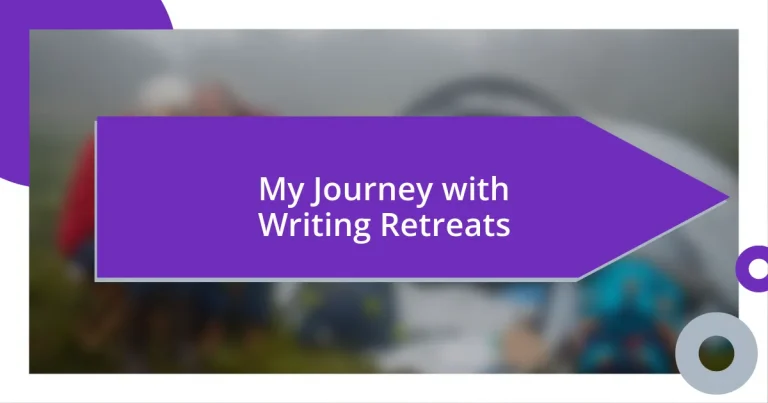Key takeaways:
- Writing retreats foster a balance of solitude and community, enhancing creativity through shared experiences and feedback with fellow writers.
- Choosing the right retreat involves considering factors like location, facilitators, writing focus, community size, and schedule.
- Preparation is crucial for a successful retreat, including packing comfort items and setting clear writing goals.
- Engaging activities during retreats, such as nature walks and group critiques, stimulate creativity and strengthen connections among writers.
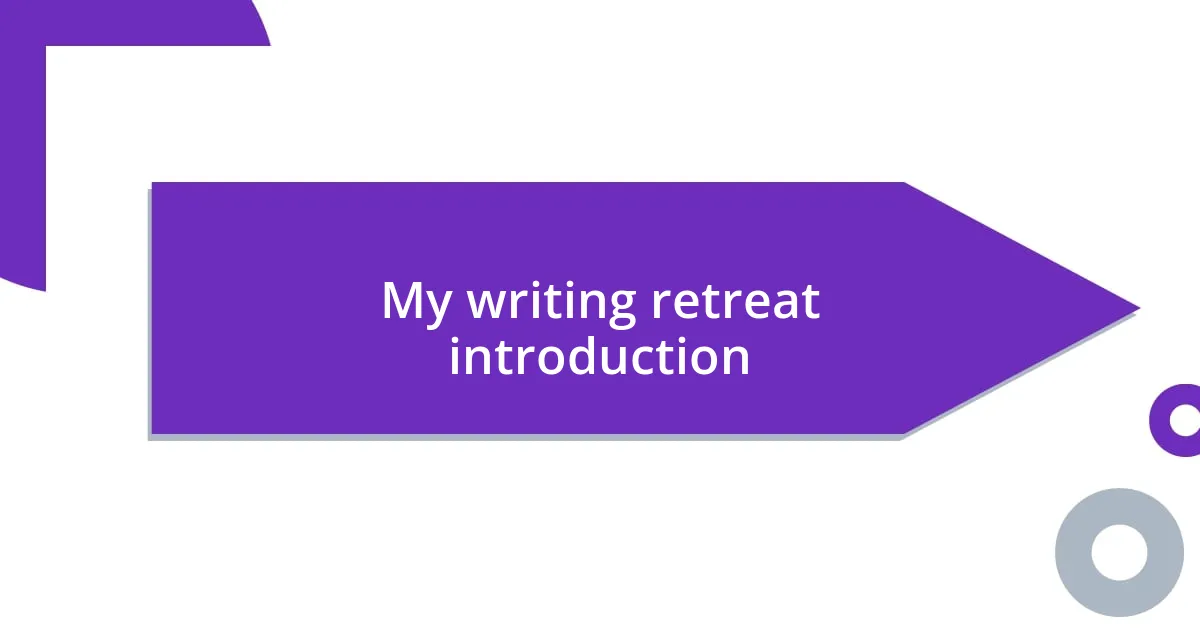
My writing retreat introduction
Embarking on my journey with writing retreats has been a transformative experience. I remember the first time I arrived at a quaint cabin in the woods, surrounded by towering trees and the gentle sound of a nearby stream. Who knew that stepping away from my familiar life could spark such creativity and connect me deeply with my writing?
At each retreat, I found a perfect blend of solitude and community. The quiet mornings spent journaling, followed by afternoons of sharing ideas and feedback with fellow writers, filled me with a sense of purpose. It’s incredible how engaging with others can shine a light on my own struggles. Have you ever felt that your voice was lost amidst the noise of everyday life? I know I have, and these retreats offered me the clarity I needed to rediscover it.
As I sat by the fireplace one evening, sharing stories and laughter with new friends, I felt a wave of gratitude wash over me. These retreats not only nurtured my craft but also built a community where vulnerability is embraced. Have you ever found a place where your creativity can flourish without judgment? I cherish these moments, as they remind me of the beauty of collaboration in an often solitary pursuit.
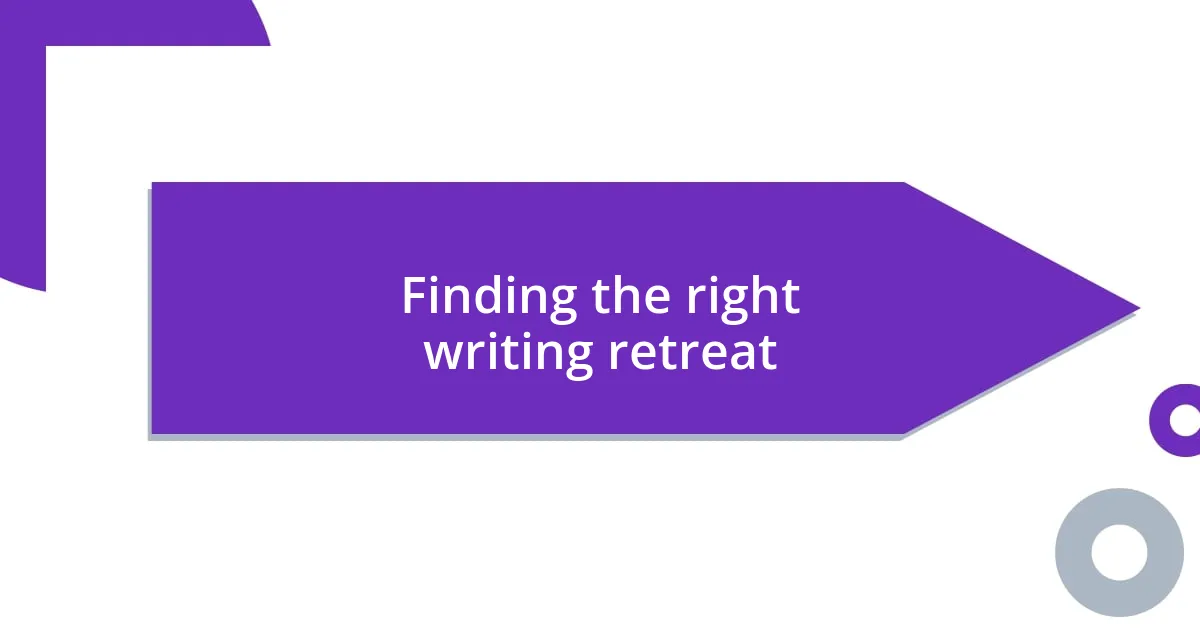
Finding the right writing retreat
Choosing the right writing retreat can significantly influence your creative process. Think back to the moment I was considering my options; I realized that not all retreats are created equal. It’s vital to align the retreat’s focus with your personal writing goals—whether you are looking for a structured workshop, free writing time, or a blend of both. I remember attending one where the daily schedule was rigorously packed. While it was invigorating, I found myself missing the leisurely pace that some of my favorite retreats offered.
Here are some key factors to consider when selecting a writing retreat:
- Location: Is it inspiring? A serene beach or a rustic mountain cabin?
- Facilitators: What are their credentials? Have they published works similar to your goals?
- Writing Focus: Does it cater to your genre (fiction, poetry, memoir)?
- Community: What is the typical group size? Will I feel lost in the crowd or welcomed into a tight-knit circle?
- Schedule: Does it have a balanced mix of writing time and collaborative sessions?
Reflecting on my experiences, I also found that the retreat atmosphere plays a crucial role. One retreat felt like a second home, where I could share my writing insecurities without fear. That sense of safety not only encouraged me to express my thoughts freely but also deepened the connections I formed with others. It’s these personal touches—like a cozy nook for writing or shared meals filled with laughter—that truly reshape the retreat experience.
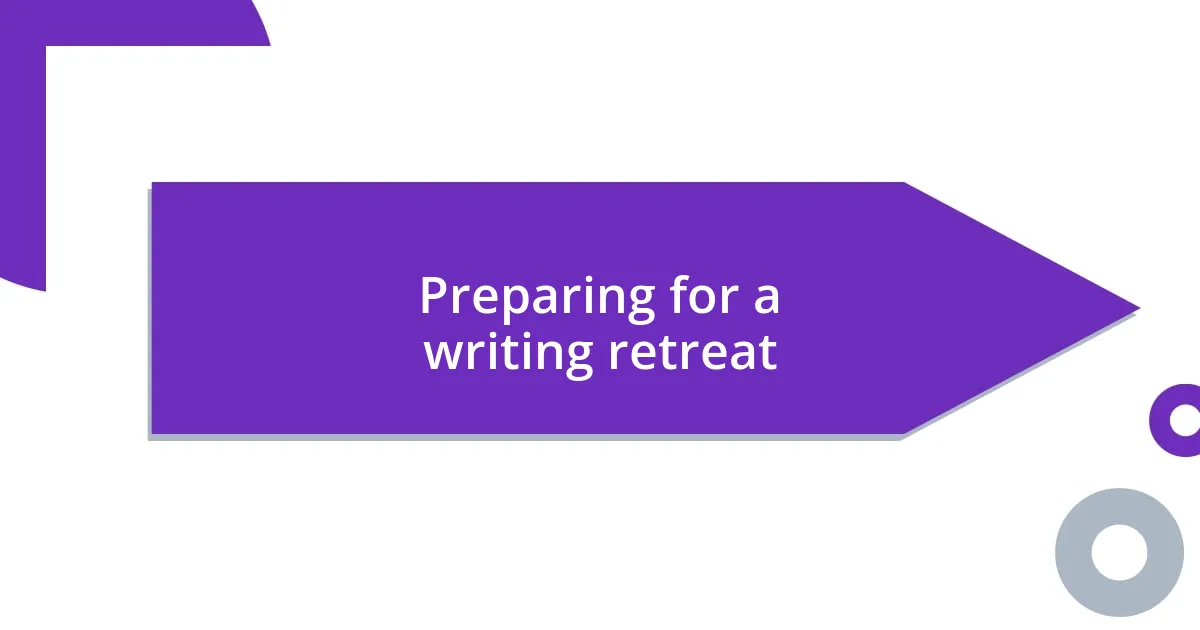
Preparing for a writing retreat
Preparing for a writing retreat involves more than simply packing your bags. I’ve learned that the anticipation can be a double-edged sword. On one hand, there’s excitement about the new environment and the potential for creative breakthroughs. On the other hand, I often felt anxiety about how to make the most of my time. To tackle this, I began creating a checklist to ensure I had everything I needed—journals, favorite pens, and a comforting pair of slippers for those cozy nights by the fireplace.
As I prepare for my next retreat, I find it helpful to set clear intentions for what I want to achieve. For instance, the last time I went, I aimed to finish a chapter of my novel. With a specific goal in mind, I felt a greater sense of purpose. It’s also important to mentally prepare. Engaging in writing exercises or reading inspiring books in the days leading up to the retreat can help you slip into a creative mindset more easily. Have you ever felt the switch flip when you immerse yourself in the right material? I certainly have, and it sets a wonderful tone for what’s to come.
Finally, packing thoughtfully can enhance the experience greatly. I learned that bringing a few comfort items—like my favorite tea or a beloved novel—could help create a warm, inviting atmosphere. The last time I forgot my cozy blanket, I realized how much I missed that touch of home. So, I encourage you to think about inclusive items that inspire you. This way, packing isn’t just about functionality; it’s about creating a retreat that feels uniquely yours.
| Checklist Item | Importance |
|---|---|
| Journals | Essential for daily writing |
| Comfortable clothing | Helps you relax and focus |
| Inspiring books | Fuel for creativity |
| Snacks | Maintains energy levels |
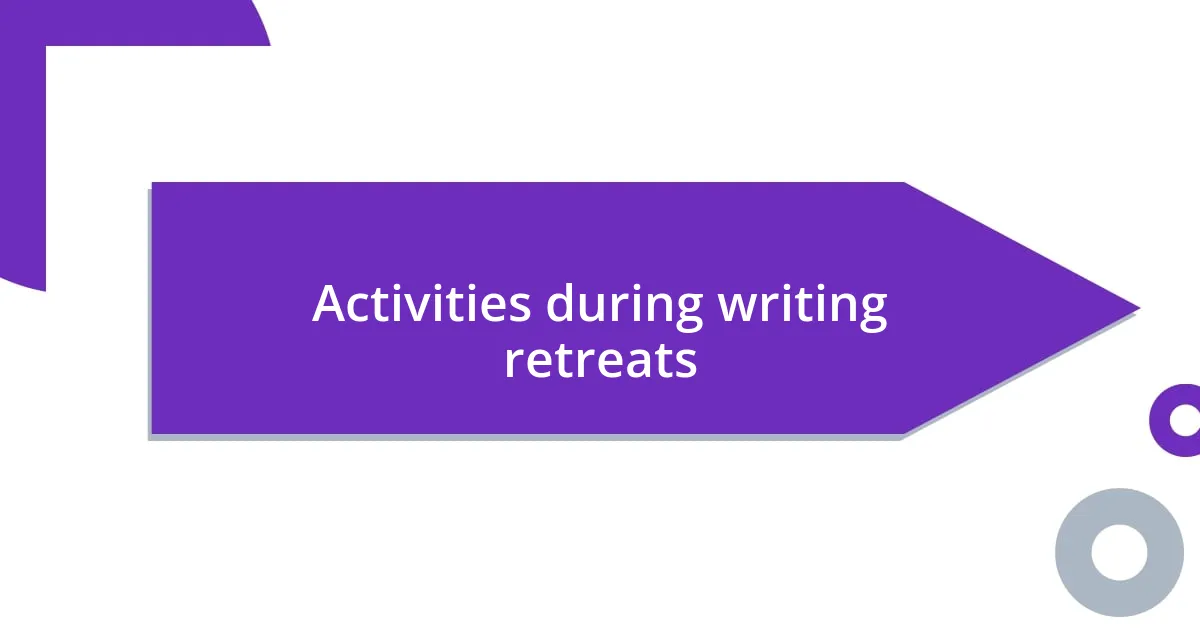
Activities during writing retreats
During writing retreats, I’ve participated in a variety of captivating activities that fuel creativity and foster connection. One memorable session involved a guided walk through picturesque landscapes, where we were encouraged to absorb the sights and sounds. I found that these moments in nature often sparked vivid imagery and fresh ideas for my writing projects. Has anyone else felt the poetic pull of nature while crafting words? I definitely have.
Another engaging activity I experienced included group critique sessions, where we would share our work and offer feedback. Initially, I was nervous—after all, sharing your raw, unpolished writing can feel a little like exposing your soul. Yet, the supportive atmosphere allowed me to grow and refine my writing. I often remind myself how vital constructive feedback is and how the perspectives of fellow writers can illuminate aspects of my work I might have otherwise overlooked.
Then there are the evenings filled with casual storytelling around a fire. These gatherings create a relaxed environment where I’ve shared not just my work, but personal stories that shaped my writing journey. I still remember the warmth of those moments—laughter mingling with the crackling flames, and the sense of camaraderie that reinforces why we come together. Wouldn’t you agree that these connections enhance the entire retreat experience? They truly do for me. Each of these activities, from nature walks to group critiques, weaves together a rich tapestry of inspiration that stays with me long after the retreat ends.
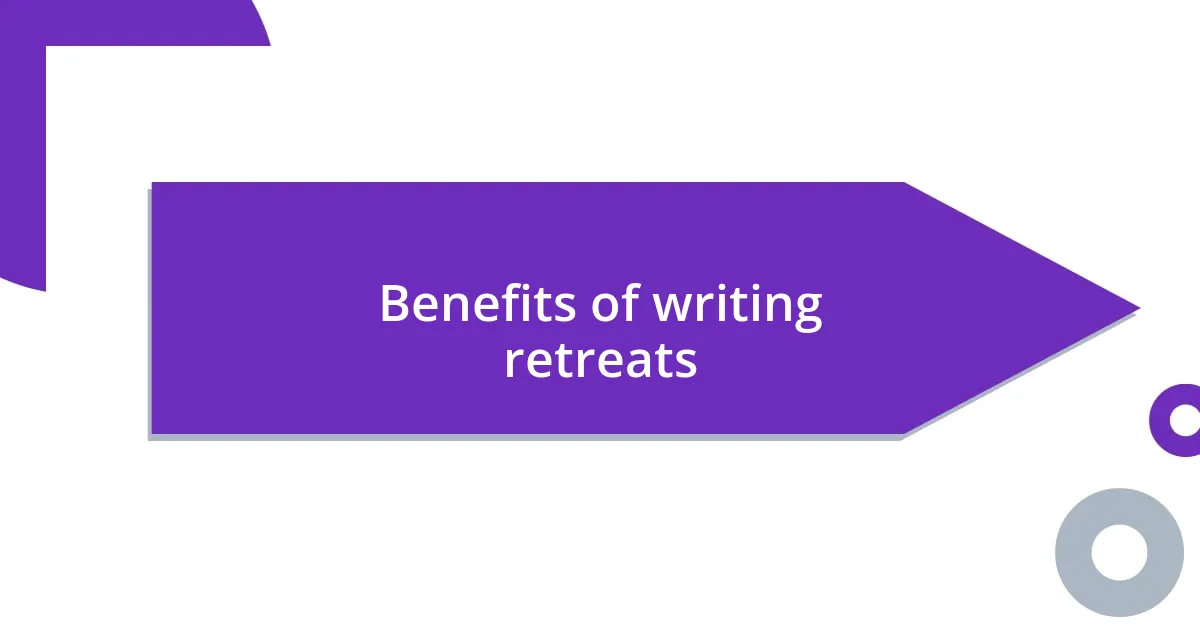
Benefits of writing retreats
Writing retreats offer a host of benefits that truly transform the creative process. One of the most significant advantages is the opportunity for dedicated focus away from daily distractions. I remember my first retreat; it was like stepping into a world where time stood still. With no phone buzzing or laundry waiting, I could immerse myself in my manuscripts. Isn’t it amazing how we can find our best ideas when we remove the chaos of everyday life?
Another benefit is the sense of community that develops among writers. Sharing meals, discussing ideas, and collaborating in workshops fosters a unique bond. I recall participating in a roundtable discussion where we shared our struggles and aspirations. Hearing others’ stories not only inspired me but also reminded me that I wasn’t alone in my journey. Have you ever felt that rush of connection when you find like-minded individuals? It reinforced my belief that our personal experiences can resonate deeply with others.
Lastly, writing retreats are fantastic for cultivating creativity through new experiences. The change of scenery often sparks innovative ideas. During one retreat, we explored local art galleries and historic sites, which infused a fresh perspective into my writing. I found myself weaving elements from those experiences into my stories, breathing new life into my characters and plots. Does your creative work flourish when you step outside your comfort zone? Mine certainly does, and that’s why I cherish these immersive experiences.
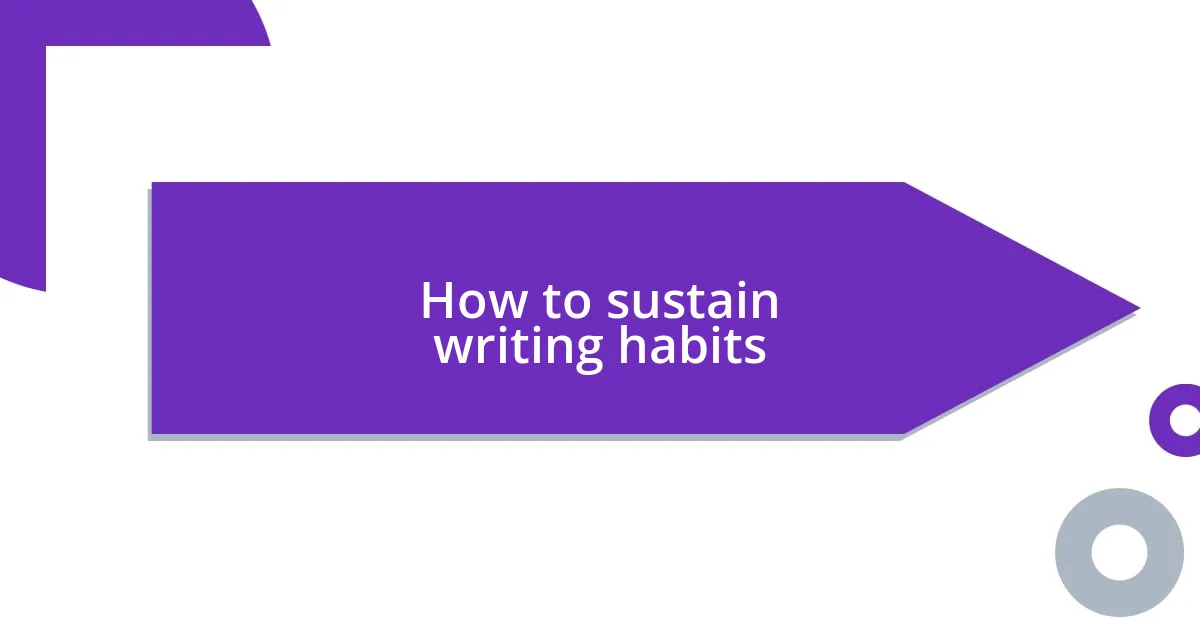
How to sustain writing habits
Sustaining writing habits can be a challenge, especially when life gets busy. I’ve found that setting small, achievable goals really helps. For instance, committing to just 10 minutes of writing each day keeps the momentum going. It’s surprising how much I can accomplish in such a short amount of time. Have you tried starting small?
Creating a writing routine also plays a crucial role in my practice. I often choose specific times during the day dedicated solely to writing, like sipping my morning coffee or unwinding in the late evening. This structure not only reinforces my commitment but creates a comforting ritual. I remember one week where I wrote every morning; those words felt like little gifts to myself. What routines work best for you?
Finally, connecting with fellow writers can significantly bolster my writing habits. Whether through online groups or local meetups, sharing my progress and challenges with others creates accountability. I recall a time when I partnered up with a writing buddy, and we shared our word counts weekly. This friendly competition inspired me to meet my goals, and we even celebrated our successes together. Who wouldn’t benefit from that sort of camaraderie?

Reflections on my writing journey
Reflecting on my writing journey, I often realize how much I’ve evolved as a storyteller. I can vividly remember the early days when each word felt like a monumental challenge. It was during one retreat that I finally let go of my fear of judgment. I shared an unfinished piece with fellow writers, and their encouraging feedback was a turning point for me. Isn’t it fascinating how vulnerability can ignite growth?
As I look back, I see a tapestry of experiences woven together by my writing retreats. Each retreat has not only taught me new techniques but also helped me discover facets of myself. For instance, I learned to embrace my unique voice, which wasn’t always easy. During one session, a mentor pointed out the charm in my quirks. Have you ever felt that moment when someone truly sees you? It was empowering, reminding me that my individuality is my strength.
The emotional connections I’ve forged with other writers have been equally transformative. I think back to late-night conversations filled with laughter and deep sharing. Those moments of vulnerability helped shape my perspective on storytelling, revealing the universal themes that connect us all. Can you remember a time when a simple conversation opened your eyes? I cherish those bonds, as they continue to enrich my writing journey in ways I never anticipated.












